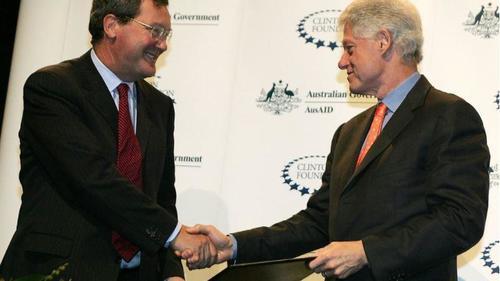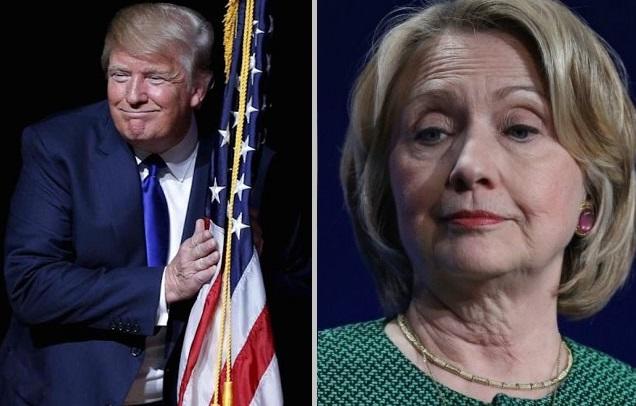As it became clear during the 2016 US election that Donald Trump had a mountain of support underneath him, nervous Democrats connected to the Hillary Clinton camp reached out to US officials over a half-dozen times, “each tapping a political connection to get suspect evidence into FBI counterintelligence agents’ hands,” according to The Hill‘s John Solomon, citing internal documents and testimonies he has reviewed, along with interviews Solomon conducted.
Each contact by a Clinton crony was unsolicited, according to Solomon’s FBI sources, in what they described as a “classic case of information saturation” meant to inject toxic and unverified opposition research into the agency’s counterintelligence apparatus that should have known better than to eventually bite.
Ex-FBI general counsel James Baker, one of the more senior bureau executives to be targeted, gave a memorable answer when congressional investigators asked how attorney Michael Sussmann from the Perkins Coie law firm, which represented the Clinton campaign and Democratic Party, came to personally deliver him dirt on Trump.
“You’d have to ask him why he decided to pick me,” Baker said last year in testimony that has not yet been released publicly. The FBI’s top lawyer turned over a calendar notation to Congress, indicating that he met Sussmann on Sept. 19, 2016, less than two months before Election Day. –The Hill
Perkins Coie, as we know, paid Fusion GPS to produce opposition research assembled by former MI6 spy Christopher Steele in his now infamous “Steele Dossier,” which suggested that Donald Trump colluded with Moscow during the 2016 election.
By the time Perkins attorney Sussman reached out to the FBI’s James Baker, the Steele dossier had already made its way inside the FBI. Sussman, however, “augmented it with cyber evidence that he claimed showed a further connection between the GOP campaign and Russian President Vladimir Putin,” according to Solomon. Some of this digital evidence was delivered on a thumb drive, according to Baker.
“[Sussmann] told me he had cyber experts that had obtained some information that they thought they should get into the hands of the FBI,” Baker testified. “I referred this to investigators, and I believe they made a record of it,” he added, telling his colleagues to “Please come get this.”
Baker acknowledged that the Clinton-linked attorney’s evidence did not follow the typical route into the FBI – but since he was the bureau’s top attorney, agents snapped-to and collected it from him.
Rewinding to Steele’s first outreach
According to Solomon, “the tsunami began when former MI6 agent Steele first approached an FBI supervisor, his handler in an earlier criminal case, in London” on July 5, 2016 – the same day that former FBI Director James Comey made the shock announcement that he would not recommend criminal charges against Hillary Clinton for mishandling classified emails on her homebrew server.
Steele’s approach was not initially embraced, however, and the FBI took no action on the dossier according to congressional investigators. Then things escalated…
Steele traveled to Washington later that month where he would reach out to two political contacts who were in positions to influence the FBI; a former State Department official under John Kerry, and former #4 DOJ official Bruce Ohr – who immediately took Steele’s “research” to then-FBI Deputy Director Andrew McCabe. Ohr would eventually warn the FBI that Steele’s information was biased opposition research, which the agency ignored.
Then-senior State Department official Jonathan Winer, who worked for then-Secretary John Kerry, wrote that Steele first approached him in the summer with his Trump research and then met again with him in September. Winer consulted his boss, Assistant Secretary for Eurasia Affairs Victoria Nuland, who said she first learned of Steele’s allegations in late July and urged Winer to send it to the FBI.
(If you need further intrigue, Winer worked from 2008 to 2013 for the lobbying and public relations firm APCO Worldwide, the same firm that was a contractor for both the Clinton Global Initiative and Russia’s main nuclear fuel company that won big decisions from the Obama administration.)
When the State Department office that oversees Russian affairs sends something to the FBI, agents take note.
But Steele was hardly done. He reached out to his longtime Justice Department contact, Bruce Ohr, then a deputy to Deputy Attorney General Sally Yates. Steele had breakfast July 30, 2016, with Ohr and his wife, Nellie, to discuss the Russia-Trump dirt.
(To thicken the plot, you should know that Nellie Ohr was a Russia expert working at the time for the same Fusion GPS firm that hired Steele and was hired by the Clinton campaign through Sussmann’s Perkins Coie.) –The Hill
The Australia connection
While Ohr had passed the Clinton-funded Steele dossier to the FBI, Australia’s ambassador to London, Alexander Downer, contacted US officials – who said Trump campaign aide George Papadopoulos drunkenly admitted to knowing that Russia had dirt on Hillary Clinton.
Downer has a major connection to the Clintons – securing a $25 million donation from the Australian government to the Clinton Foundation in the early 2000s. Between 2006 and 2014, the Clinton FOundation received some $88 million from Australian taxpayers

Downer’s tip on Papadopoulos launched Operation Crossfire Hurricane – the FBI’s counterintelligence operation which employed spies to infiltrate the Trump campaign.
Continuing with the Trump-Russia “saturation campaign” was the September 2016 delivery of more anti-Trump opposition research delivered to Winer and Nuland – the Kerry State Department employees. This time, however, the opposition research was crafted by known Clinton associates Sidney Blumenthal and Cody Shearer. This second “dossier” was also sent to the FBI.
All in all – it was a full court press against Trump and his campaign – including an outreach by Christopher Steele to the media which resulted in the FBI severing their relationship with him (despite using his research as the foundation for a FISA spy warrant against Trump campaign aide Carter Page).
By mid-September — less than a month before Election Day — there likely was agitation inside the Clinton machine: After so many overtures to the FBI, there was no visible sign of an investigation.
Simpson and Steele began briefing reporters with the hope of getting the word out. It is taboo for an FBI source such as Steele to talk to the media about his work. Yet, he took the risk, eventually getting fired for it, according to FBI documents.
Baker, the FBI’s top lawyer, testified to Congress that he was clearly aware Simpson’s team was shopping the media. “My understanding at the time was that Simpson was going around Washington giving this out to a lot of different people and trying to elevate its profile,” Baker told congressional investigators.
Ohr, through his contacts with Steele and Simpson, also knew the media had been contacted. In handwritten notes from late 2016, Ohr quoted Simpson as saying his outreach to reporters was a “Hail Mary attempt” to sway voters. –The Hill
Congressional push…
Clinton’s opposition research got some congressional assistance when then-Senate Minority Leader Harry Reid – after having been briefed by then-CIA Director John Brennan, sent a letter to the FBI in late October, 2016 “demanding to know if agents were pursuing the evidence,” writes Solomon.
In other words, the Trump-Russia narrative from Team Clinton was promoted through the State Department, Congress, Justice Department and a top Democratic lawyer. And nobody in the FBI – according to what we know, made any efforts to interfere with an obvious attempt at a political hit job.
In another timeline, Hillary Clinton won the election and none of this information would have come to light. That said, it doesn’t seem to matter anyway since there’s clearly a ruling class that’s above the law – whether they win elections or not.
via ZeroHedge News http://bit.ly/2sHImpz Tyler Durden
